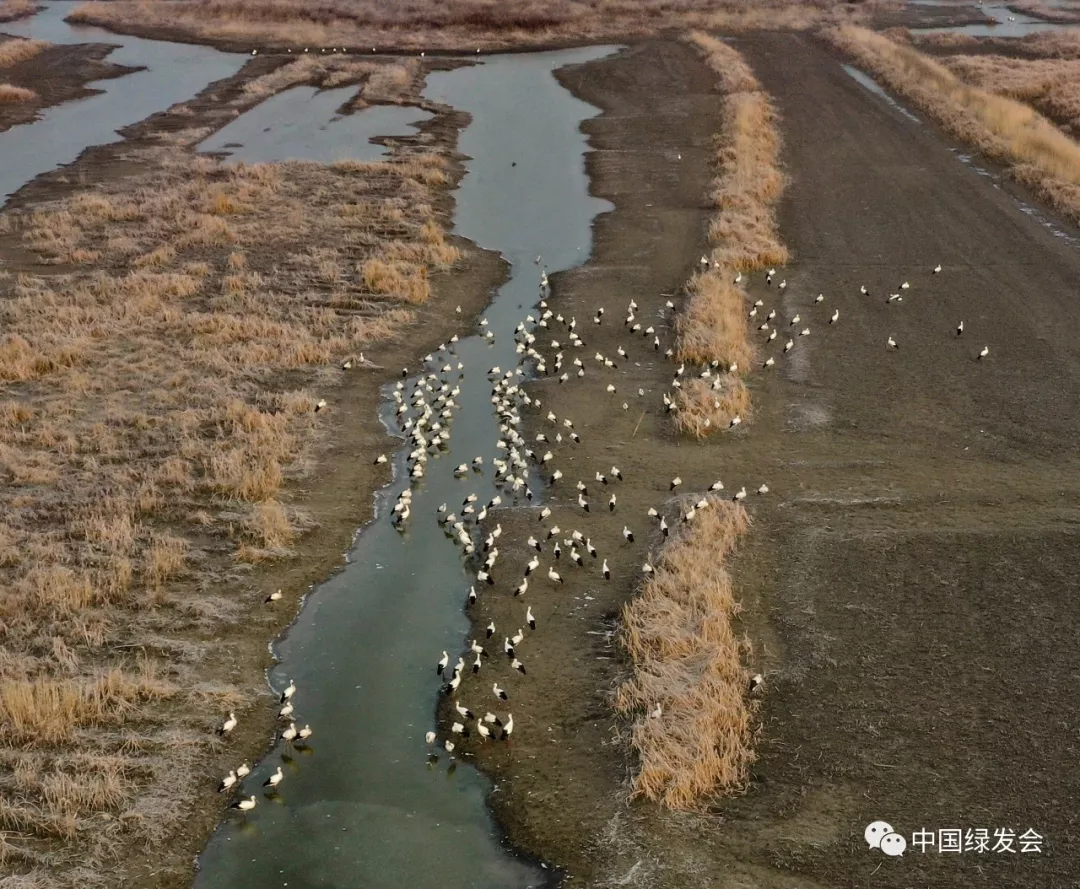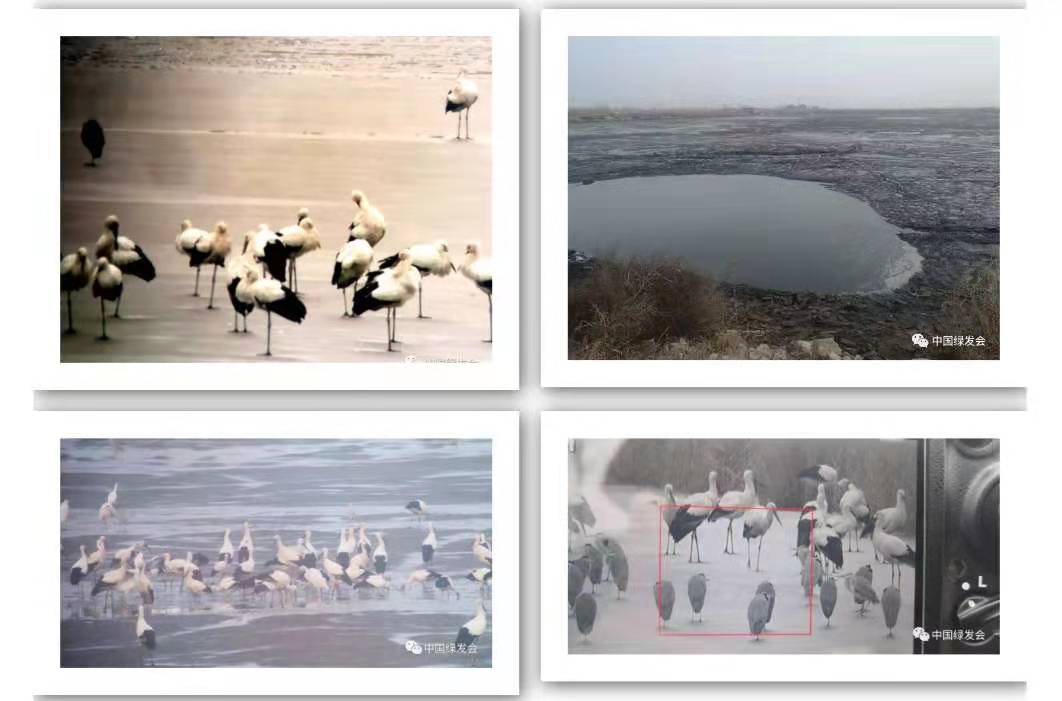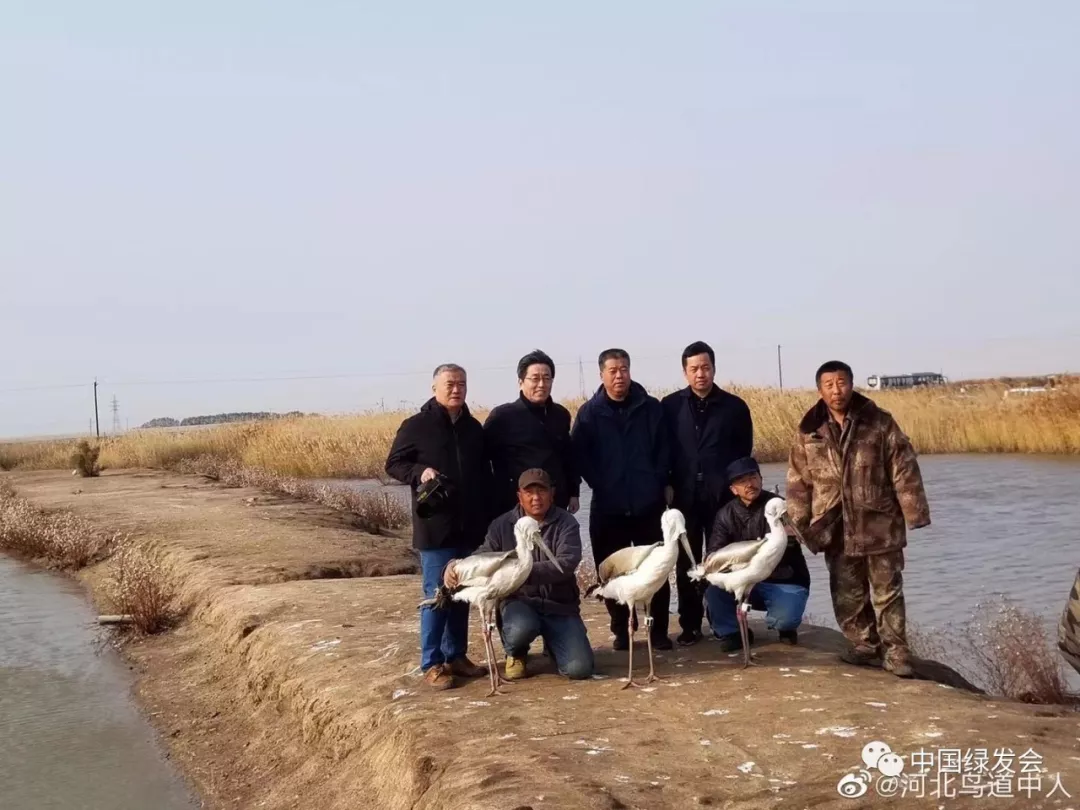After the winter solstice, North China became much colder. In recent days, the volunteers of China Biodiversity Conservation and Green Development Foundation (CBCGDF) patrolled the Oriental Storks in the field and found that the wetlands in Tianjin and Hebei areas have gradually frozen, making it more difficult for the long-distance flying Oriental Storks to find food. At the same time, the situation of their group survival and food grabbing has doubled the risk of the Oriental stork’s poaching.
In the early morning of December 23rd, despite the severe cold, volunteers from the Oriental Stork Conservation Area of CBCGDF patrolled around the Qilihai Wetland in Tianjin and found that the ditches outside the wetland were completely frozen. As volunteers were not allowed to enter the conservation area to assist in patrol, but at noon of the same day, volunteers found that the water surface of the Qilihai Wetland had frozen, but 238 Oriental Storks remained in the wetland. Two days ago, volunteers checked 528 Oriental Storks in the Qilihai Wetland. The volunteers guessed that another large group of Oriental Storks had flown to the outside of the protected area to feed.
Sure enough, in the afternoon of that day, in a fishpond on the left bank of Duliujianhe River, Wangwenzhuang Town, Xiqing District, outside the conservation area, volunteers found another large group of Oriental Storks. After counting, there are 218 Oriental Storks. Due to the cold weather, the water surface of the fishpond has frozen in the morning. The Oriental Storks standing on the ice has no food to look for but still refuses to leave. By about 5:00 p.m. on the 23rd, the Oriental Storks, who had been waiting for almost a day in this fishpond, were still waiting patiently. After observation, the volunteers found out that the reason why they did not leave was that the fishpond was one of the few in the area which was still releasing the small fish. The volunteer asked the owner of the fishpond to know that the day before (22nd) the fishpond began to release fish, and all of them were about 150g to 200g crucian carp. This kind of fish is exactly the perfect food for the Oriental Storks! Because of this, they found that they can find food here yesterday, and they came again on the 23rd in the morning and have been waiting for the owner of the fishpond to leave again. When it’s safe, they can grab one or two to satisfy their hunger!
The volunteers of CBCGDF patiently talked with the fishpond owner about the protection of Oriental Stork. They hoped that when the fishpond owner went out, he could consider leaving some life-saving food for these rare and long-distance migration birds. For fear of the recurrence of the suspected poisoning of the Oriental Stork on December 4th, the volunteers contacted the Forestry Department of Xiqing District and told the other side to provide more guarding work. The volunteers didn’t leave until after 7:00 p.m. that night.
“At present, there should be no problem with their safety, but starvation has become a big problem", said Mr. Wang, a professional volunteer. Through the birdwatching telescope, he can see that some of the Oriental Storks are weak in the physique. If they can’t replenish food in time, it will be a problem to continue moving south. Also, his bigger worry is that if the food is insufficient, these stranded Oriental Storks will take the form of group “looting” and collective foraging, and their risk of being poached will be multiplied!
In Caofeidian, Hebei Province, not far from Tianjin wetland, Mr. Tian Zhiwei of CBCGDF's "China Conservation Area for Waterfowl ? Tangshan" observed almost simultaneously that the number of Oriental Storks who came to this small reserve to seek help for food had increased significantly in recent days. Two groups of Oriental storks, which had been released before and came to seek help for food, had already flown away. However, as the weather turns cold, the number of the third batch of Oriental Storks to the area has increased significantly this winter, and the time of foraging has been much earlier than before. "They used to fly over at noon, but now they fly over at 7 a.m. and they are hungry", Mr. Tian said. On the 23rd, 16 Oriental Storks came here to feed successively. To replenish the migrating birds in time, since the first ten days of December, he has almost released fish into two ponds of the rescue station every day, with an average of 22 - 33 lb per day, so that they can replenish their energy.
As for the experts concerned that feeding on wild migratory birds will affect their behavior, Tian Zhiwei said that through his years of observation on the behavior of Oriental Storks who come to ask for help, he believes that if they are threatened by hunger, they will not be affected in the wild. “Through the supplement proved that these oriental storks can be replenished after the physical energy, can fly from food shortage to the winter place”, Tian said. In September, an oriental stork, identified as BFU125, was brought to Tangshan rescue station from Jilin Province and released on November 16th after being cured. According to its monitoring data, it stayed in Tianjin for more than 10 days before reaching Poyang Lake in Iiangxi Province on December 5th.



(Photo credit: CBCGDF volunteers)
Original Chinese article:
http://www.cbcgdf.org/NewsShow/4854/10807.html
By / Xue Tongtong
